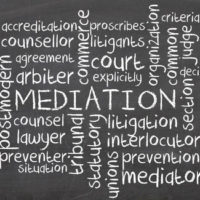Undoing a Mediated Settlement Agreement

Mediation has become an increasingly popular choice for many divorcing couples who want to avoid the cost and stress of litigation. Whether mediation is entered into voluntarily or as a result of a judge’s court order, the negotiation process remains the same and is overseen by a neutral third party who attempts to help the parties reach a compromise on certain issues, such as property division and child custody. These types of negotiations definitely have their advantages. Unfortunately, it is not uncommon for one party to end up submitting to a settlement agreement that is later revealed to be unfair. Settlement agreements entered into during mediation are treated like contracts that are later incorporated into a final decree of divorce, which makes them enforceable. This means that attempts to have these agreements set aside is difficult, so it is critical for those who are considering mediation to contact an experienced divorce mediation attorney who can explain their legal options.
When Will a Court Set Aside a Mediation Settlement Agreement?
Overturning a settlement agreement that was reached through mediation isn’t easy, but it’s also not impossible. However, courts are generally only willing to set aside a settlement agreement reached during mediation if there is evidence that one party’s lack of information and level of knowledge about the issue at hand prejudiced his or her ability to make a reasoned decision. These types of situations are especially common when couples decide to enter into mediation before they even file for divorce, as it is much easier to hide assets at this point in the proceedings. Later, during the discovery process, it may become clear that one party was keeping something important from the other. Even in these cases, courts will usually only throw out a settlement agreement if the petitioning party can provide evidence:
- Of fraud, deceit, coercion, duress, misrepresentation, or overreaching; or
- That the terms of the agreement were unfair or unreasonable to one party.
Demonstrating this level of fraud is difficult, as courts are not willing to overturn an agreement just because one of the parties made a bad financial decision. Instead, courts will look for proof of intentional misconduct on the part of one spouse or a significant lack of knowledge about marital finances.
Once the actual divorce process is triggered and both parties have had the benefit of gathering financial information during the discovery process, it becomes much more difficult to have a mediated settlement agreement set aside. In these cases, petitioning parties will need to file an appeal with the court or request relief from judgment, at which point the court will usually only be willing to overturn the agreement if there is evidence of intentional fraud or newly discovered evidence.
Obtain Legal Help Today
If you have questions about whether mediation is right for you or you have already entered into an agreement that you believe was unfair, please don’t hesitate to call dedicated divorce mediation attorney Sandra Bonfiglio, P.A. at 954-945-7591 today for a free case evaluation.
Resource:
flcourts.org/resources-and-services/alternative-dispute-resolution/mediation.stml







